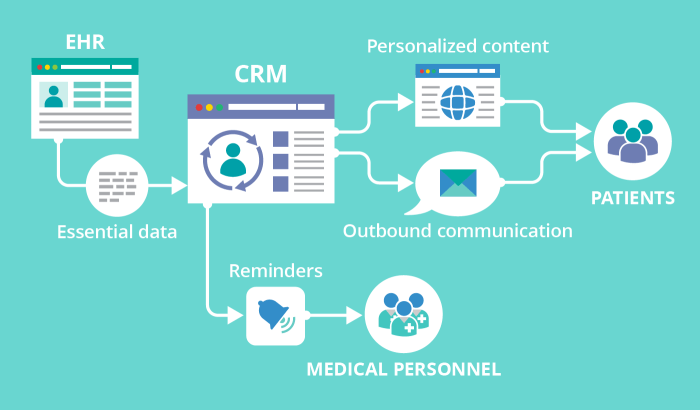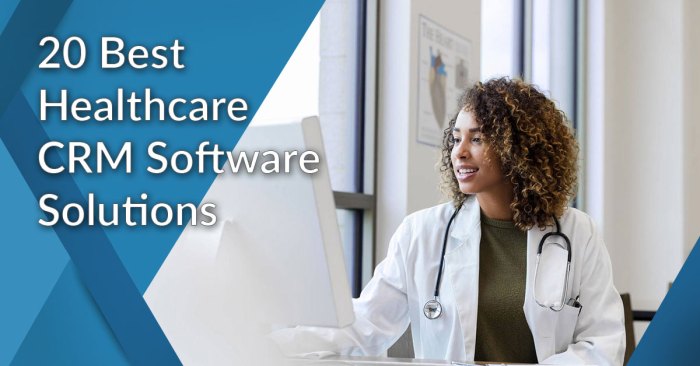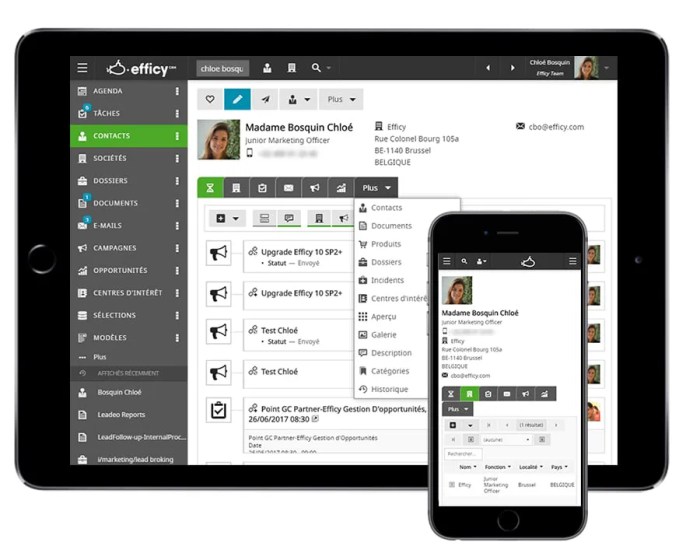The healthcare industry is undergoing a digital transformation, and Customer Relationship Management (CRM) software is playing a crucial role. A robust healthcare CRM system can streamline operations, improve patient engagement, and ultimately enhance the quality of care. Choosing the right software, however, requires careful consideration of various factors. This comprehensive guide will delve into the best healthcare CRM software options available, exploring their features, benefits, and suitability for different healthcare practices.
Understanding the Need for Healthcare CRM Software
Healthcare providers face unique challenges in managing patient relationships. From scheduling appointments and managing medical records to tracking patient interactions and ensuring regulatory compliance, the workload can be overwhelming. A healthcare CRM system offers a centralized platform to manage all these aspects efficiently. Key benefits include:

Source: erpcrmprovider.com
- Improved Patient Engagement: Personalized communication, appointment reminders, and follow-up messages enhance patient satisfaction and adherence to treatment plans.
- Streamlined Workflow: Automation of tasks like appointment scheduling, billing, and reporting frees up staff time for patient care.
- Enhanced Communication: Secure messaging, telehealth integration, and centralized communication channels improve coordination among healthcare providers and patients.
- Better Data Management: Centralized patient data ensures easy access to complete medical history, improving the accuracy of diagnoses and treatment plans. This also aids in reporting and analytics.
- Increased Revenue: Efficient billing and follow-up on outstanding payments can significantly improve revenue cycle management.
- Improved Compliance: Healthcare CRM systems can help maintain compliance with HIPAA and other relevant regulations by ensuring data security and privacy.
Key Features to Look for in Healthcare CRM Software: Best Healthcare Crm Software
When selecting a healthcare CRM, consider these essential features:
Patient Management Capabilities:
- Centralized Patient Database: A single, easily accessible repository of all patient information, including medical history, insurance details, and contact information.
- Appointment Scheduling: Integrated scheduling tools to manage appointments efficiently, reducing no-shows and maximizing clinic utilization.
- Electronic Health Records (EHR) Integration: Seamless integration with existing EHR systems for a holistic view of patient data.
- Patient Portal: A secure online portal for patients to access their medical records, schedule appointments, and communicate with providers.
Communication and Engagement Tools:
- Automated Communication: Automated appointment reminders, follow-up messages, and birthday greetings to enhance patient engagement.
- Secure Messaging: HIPAA-compliant messaging system for secure communication between patients and providers.
- Telehealth Integration: Integration with telehealth platforms for virtual consultations and remote monitoring.
- Marketing Automation: Tools for targeted marketing campaigns to reach specific patient demographics.
Reporting and Analytics:, Best healthcare crm software
- Customizable Reporting: Ability to generate custom reports on key performance indicators (KPIs) such as patient satisfaction, appointment utilization, and revenue.
- Data Visualization: Tools to visualize data and identify trends to improve operational efficiency.
- Predictive Analytics: Advanced analytics to predict patient behavior and optimize resource allocation.
Other Important Considerations:
- HIPAA Compliance: Ensuring the software meets all HIPAA regulations for data security and privacy.
- Scalability: The ability to adapt to the changing needs of the practice as it grows.
- Integration with other systems: Seamless integration with existing billing systems, EHRs, and other healthcare software.
- Customer Support: Reliable customer support to address any technical issues or questions.
- User-Friendliness: Intuitive interface that is easy for staff to learn and use.
Top Healthcare CRM Software Options
The market offers a variety of healthcare CRM solutions. The best choice depends on the specific needs and size of your practice. Some popular options include (Note: This is not an exhaustive list and specific features and pricing can change):
- Salesforce Health Cloud: A comprehensive platform with robust features for managing patient relationships, integrating with EHR systems, and providing advanced analytics. It’s often a good choice for larger healthcare organizations.
- HubSpot CRM: A user-friendly and scalable option with a free version available. While not specifically designed for healthcare, its flexibility allows for customization to meet specific needs.
- Practice Fusion: An EHR and CRM solution integrated into one platform, streamlining workflows and improving data management. It’s designed specifically for medical practices.
- Kareo: A comprehensive solution that combines practice management, billing, and CRM functionalities. It’s known for its ease of use and strong customer support.
- athenahealth: A cloud-based platform that offers a range of services, including CRM, EHR, and practice management tools. It’s popular among larger practices and hospitals.
It’s crucial to research each option thoroughly, considering your specific requirements and budget before making a decision. Many vendors offer free trials or demos, allowing you to test the software before committing to a purchase.

Source: financesonline.com
Frequently Asked Questions (FAQs)
- Q: What is the cost of healthcare CRM software? A: The cost varies significantly depending on the features, vendor, and number of users. Some offer free plans with limited features, while others have tiered pricing based on usage and functionality.
- Q: Is healthcare CRM software HIPAA compliant? A: Reputable vendors prioritize HIPAA compliance. However, it’s essential to verify the software’s compliance certifications before implementation.
- Q: How long does it take to implement healthcare CRM software? A: Implementation time depends on the complexity of the software and the size of your practice. It can range from a few weeks to several months.
- Q: What are the key benefits of using a healthcare CRM? A: Key benefits include improved patient engagement, streamlined workflows, enhanced communication, better data management, increased revenue, and improved compliance.
- Q: Can healthcare CRM software integrate with my existing EHR system? A: Many healthcare CRM systems offer integration capabilities with various EHR systems. Check the vendor’s specifications to ensure compatibility.
Choosing the Right Healthcare CRM: A Final Word
Selecting the best healthcare CRM software is a crucial decision that can significantly impact the efficiency and success of your practice. By carefully considering your specific needs, evaluating key features, and researching different vendors, you can find a solution that optimizes patient care, improves operational efficiency, and enhances your overall bottom line. Remember to prioritize HIPAA compliance and user-friendliness when making your choice.
References:
Disclaimer: This information is for general knowledge and informational purposes only, and does not constitute medical or professional advice. Always consult with a qualified professional for any health concerns or before making any decisions related to your healthcare practice.
Call to Action:
Ready to streamline your healthcare practice and improve patient engagement? Explore the options mentioned above and request a demo today! Find the perfect healthcare CRM solution to elevate your practice to new heights.

Source: b-cdn.net
FAQ Overview
What are the key features to look for in healthcare CRM software?
Key features include secure patient data storage, HIPAA compliance, appointment scheduling, patient communication tools (e.g., email, SMS), reporting and analytics dashboards, and integration with electronic health records (EHR).
How much does healthcare CRM software typically cost?
Pricing varies greatly depending on the features, number of users, and vendor. Expect a range from subscription-based models with monthly fees to larger upfront investments for more comprehensive systems. Request quotes from multiple vendors to compare.
Is healthcare CRM software HIPAA compliant?
Reputable vendors offer HIPAA-compliant software, but it’s crucial to verify compliance certifications and security measures before implementation. Ask for documentation proving their adherence to HIPAA regulations.
Can healthcare CRM software integrate with my existing EHR system?
Many CRM systems offer integration capabilities with popular EHR systems. Check for compatibility with your specific EHR before selecting a CRM solution to ensure seamless data flow.
